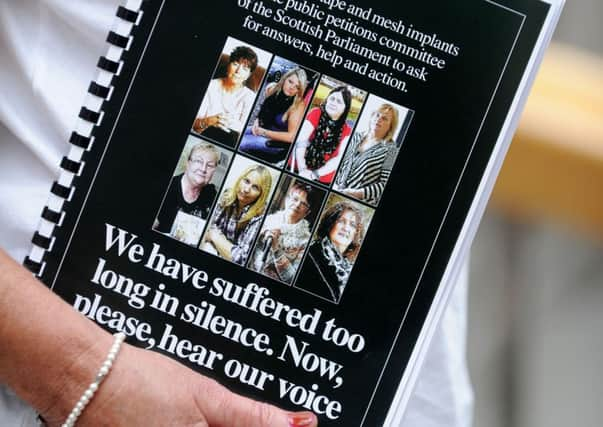Mesh implant watchdog heckled over risks at Holyrood


Dr Neil McGuire of the Medicines and Healthcare Products Regulatory Agency (MHRA) was heckled by angry campaigners, many wheelchair-bound from mesh side-effects, as he told MSPs there are no plans to withdraw them from use.
Many health boards in Scotland have continued to use the controversial devices used to treat organ prolapse and urinary incontinence, despite former health secretary Alex Neil calling for them to be banned.
Advertisement
Hide AdAdvertisement
Hide AdDr McGuire said: “If we had a higher level of reporting that showed that there were more complications than we are seeing then we’re always prepared to change our view.
“So if we had thousands and thousands of reports to say this was an issue, that wasn’t in the complication rate that was deemed acceptable by the clinical community, then we would change our stance.
“But we can’t act without information - and that information does not appear to be out there.”
Greater Glasgow and Clyde, Borders, Fife and Grampian are among the health board areas which still carry out mesh implants and have used the MHRA report as the basis for this, This is despite former health secretary Alex Neil calling for a moratorium on their use, while further work is carried out into the safety concerns.
Dr McGuire, a consultant in intensive care and anaesthesia, was asked if Mr Neil was being “irresponsible” in calling for the ban.
“I think that would be probably be a question I wouldn’t answer,” the clinician added.
Tory committee member Jackson Carlaw said: “I’ll take that to mean Yes.”
The medic added that the Scottish Government has imposed the moratorium without any new evidence being provided.
Advertisement
Hide AdAdvertisement
Hide AdMSPs at Holyrood have been investigating the issue, following a number of harrowing examples of women suffering infections and bleeding following the surgery and long-term side effects.
Campaigners say many are left with chronic pain, permanent disability and the need for wheelchairs and walking aids or even the loss of a kidney or bladder.
The Scottish Government’s review into the use of mesh impants will report ir
But Elaine Holmes of the Scottish Mesh Survivors campaign group, who attended yesterday’s meeting branded Dr McGuire “dismissive and evasive.”
She said: “We’ve been going through this for years. They say there’s a lack of evidence to support a mesh suspension or indeed even to issue a warning. What more evidence does he need?”
“They say there’s only been 88 reports to the MHRA, but women have surgery they’re not told if you have an adverse reaction you must report it to the MHRA. Women are often to ill to understand there can be a process for this.”
Olive McIlory, who has jointly lodged a petition at Holyrood calling for ban, said the MHRA is aware of under-reporting and there are no long-term studies.
“Patient safety is righat the bottom of the agenda - they’re not interested,” she said.
Advertisement
Hide AdAdvertisement
Hide AdMSPs also heard yesterday frm US lawyer Adam Slater who likened mesh implants to asbestos and described them as “very dangerous devices.”
The lawyer has worked almost exclusively on mesh cases in the US since 2007, said some doctors are now refusing to use the devices, with one even branding them as “social cancer”.
He is currently the lead counsel for more than 7,000 cases in New Jersey.
“The closest analogy I can find is asbestos,” he told the committee.
“Something that was thought to be a wonderful invention for a long time and now everybody in the world knows it is something you wouldn’t want to go anywhere near.”
He said thousands of women in the US are suing both manufacturers and doctors on the grounds that mesh devices are defective or that there was a failure to warn them about the dangers and complications.
The US regulator, the Food and Drug Administration (FDA), indicated last April that it plans to reclassify mesh for pelvic organ prolapse as “high risk”, but is yet to do so.